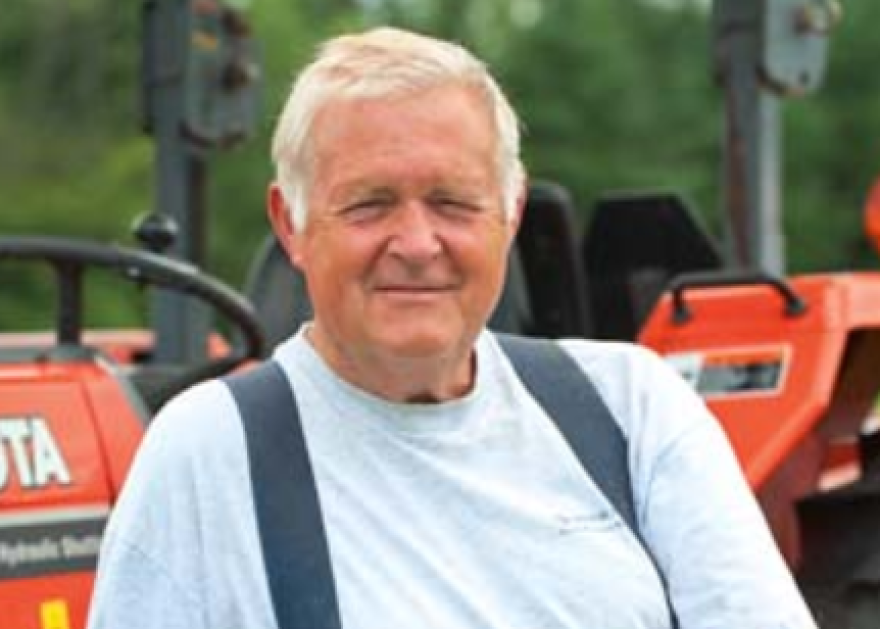As milk prices have dropped across the country, small commercial dairy farms in New Hampshire have had to close. The trend has now swept up one of the Granite State's best-known farmers: Steve Taylor, a former long-time commissioner of agriculture.
Taylor plans to close the commerical milking part of his farm. He spoke with All Things Considered host Peter Biello about the market forces and the farm he founded in 1970.
(Below is a lightly edited transcript of Peter Biello's interview with Steve Taylor.)
You have run this farm for more than four decades. The dairy operation has been a part of it for that time. How does it feel to close up the milking operation?
Well, I respond in several ways. Number one, of course, it's a very emotional thing. It is ... it is almost heartbreaking to have to preside over a dissolution of something that I spent my whole lifetime working to build up. Number two, I have to say it's business and you have to recognize that. Right now the dairy business, at the micro level and at the national level, is a very, very difficult place and a lot of people are not thriving in dairy there. Everybody is struggling as far as I'm concerned. Whether you are a little small operation or mega operation, the milk prices is horrible.

Why is it so difficult for milk producers both big and small?
It's an undisciplined situation, where the incentives are perverse. If times are good the milk price is favorable. In other words, the milk is bringing in a lot of money. The incentive there is to expand, to increase production to pay down debt to build equity. On the other side of the coin, when times are tough the milk price is down, it's almost imperative to try to milk more cows, get more production. So when you end up you have chronic oversupply and milk is an inelastic commodity, meaning additional supply at a reduced price does not attract more customers. As you can only drink so much milk or eat so much yogurt. We're in sharp contrast with Canada.
In Canada they have a disciplined system where the market is assessed and a production limit is established and farms produce to meet them the limit and that's all. There is no more. And so they enjoy a good price and consumers support it. The whole thing works.
They like the idea of farms in their midst. They recognize what we have contributed in terms of preserving open space, just the atmosphere of rural New Hampshire, and when that's lost I think people feel saddened by it. -Steve Taylor
Let me ask you a supply and demand question. Of course, personally it is difficult to have to close down the dairy operation at your farm. But is it better for the market as a whole to have fewer dairy producers so that maybe the supply of milk goes down so the demand goes up and prices go up?
Well yeah, but it isn't few producers, it's the number of cows because we've been steadily increasing the size of the remaining dairy farms and so there's no real reduction over the last decade in numbers of cows producing milk. So we have farms here in the Connecticut valley where they milk as many as 1,500 cows now. A 1,500 cow dairy is roughly the equivalent of 35 of the traditional 50 cow dairy farm. On its face, it's hard to explain, but the fact of the matter is not only are we having fewer dairy farmers but the remaining farms have been getting bigger. And then there's the enormous impact of modern genetics and science and technology that continuously increase production per cow.
How typical is your story among New Hampshire dairy farmers?
Well, we've been gradually cleaning out dairy farms. When I first started as the New Hampshire commissioner of agriculture in 1982 we had over 500 farms producing milk for the commercial market and now we're down to barely a hundred.
So four-fifths of those farms went away in roughly 30-35 years and across the country it is the same. Just talking with a person who knows the situation in Wisconsin, right now they're hemorrhaging farms, they are losing a farm and a half a day in Wisconsin -- the second biggest dairy state in the country.
What's the cultural cost for people in New Hampshire. As dairy farms close what do we lose as we lose these smaller dairy farms?
It has an effect. Just in the last few days, I've had people at the Post Office or the general store, bumped into here and there, they all grieve. They share the feeling of loss. They like the idea of farms in their midst. They recognize what we have contributed in terms of preserving open space, just the atmosphere of rural New Hampshire, and when that's lost I think people feel saddened by it.
That is Steve Taylor. He is New Hampshire's former commissioner of agriculture and owner of Taylor Farm in Meriden which will still be producing cheese and maple products. Steve, thank you very much for speaking with me.
My pleasure.








